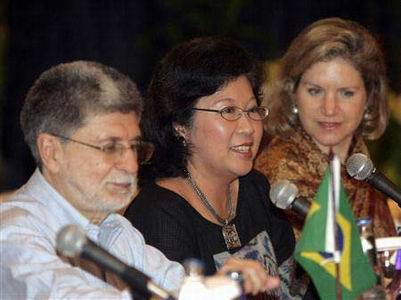
(L-R) Brazilian Minister of External Relations Celzo
Luiz Amorim, Indonesian Trade Minister Mari Elka Pangestu and US Trade
Representative Susan C. Schwab attend a news conference after the Informal Trade
Ministers Dialogue on Climate Change Issues meeting in Jimbaran, Bali island
yesterday.--Xinhua/Reuters
There was still a divergence of views on how best trade can help to mitigate
and adapt to climate change, whilst keeping development objectives in mind, said
the Indonesian trade minister in Bali yesterday.
"We are considering to work together with international agencies to study
further how international trade would contribute positively to the climate
change issue," said Minister Mari Elka Pangestu after ministers and vice
ministers of trade and representatives of international organizations wrapped up
their two-day informal dialogue on climate change.
The Informal Trade Ministers Dialogue on Climate Change (ITMD),initiated by
the government of Indonesia, was held on the sidelines of the United Nations
Framework Convention on Climate Change (UNFCCC). This is the first meeting among
trade ministers on climate change issues.
Trade ministers as policy makers have conducted open and in-depth discussions
on important issues on climate change which become the concern of the world
including the developing countries. And at the end of the informal dialogue,
they proposed a number of recommendations as a contribution concerning the
issues of trade and climate change, said Mari Pangestu at a press conference.
In undertaking multilateral actions, the dialogue emphasized the need to
fully respect multilateral principles that exist in both the climate change and
international trade context. Such principles include the common but
differentiated responsibilities and respective capacities, non-discrimination,
transparency, science and rules based and special and differential treatment.
It was stressed that international trade, development and climate change are
mutually supportive. And international trade plays an important role in
concerted multilateral efforts to address climate change issues for the future
of sustainable development.
It was also stressed that whatever policies or mechanisms implemented to
combat climate change must be taken in such a way as to minimize adverse social
and economic impacts, and in a manner that is compatible with international
trade rules so as it would not constitute a means of arbitrary or unjustifiable
discriminations or a disguised restriction on international trade.
The ministers suggested the following concrete proposals:
-- The urgent and successful conclusion of the Doha Development Agenda
negotiations, including the environment mandate.
-- More comprehensive study and better empirical evidence on the linkages and
interface between international trade development, and climate change, to
enhance understanding and to enable trade ministers to take informed and more
appropriate actions.
-- Intensify high-level engagement and interaction on the issue of
international trade and climate change.
-- Encourage future hosts of UNFCCC Conference of Parties' meetings to hold
further dialogues as trade ministers platform on the issue of international
trade and climate change, and to look at the possibility of holding a joint
session with finance and development Ministers.
-- Strengthen and enhance engagement between the WTO and UNFCCC through
information exchange mechanisms with the view to better improve the mutual
supportiveness of international trade and climate change objectives.
The United Nations Climate Change Conference in Bali, which opened on Monday,
went into a recess yesterday.



